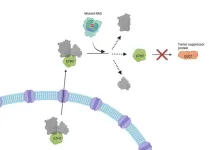(Press-News.org) Research Highlights:
In an analysis of more than 7,000 stroke survivors, those who were taking either a GLP1-receptor agonist or an SGLT2 inhibitor medication had a lower risk of a subsequent stroke, heart attack or death compared to peers who were not prescribed the medications during a three-year follow up period.
The analysis used health data from the Rochester Epidemiology Project collected from 2000 to 2022. The first GLP-1 medication was prescribed beginning in 2006, and the authors included cases beginning in 2000 to increase the power of the study, they noted.
Note: The study featured in this news release is a research abstract. Abstracts presented at American Heart Association’s scientific meetings are not peer-reviewed, and the findings are considered preliminary until published as full manuscripts in a peer-reviewed scientific journal.
Embargoed until 4 a.m. CT/5 a.m. ET, Monday, Nov. 11, 2024
DALLAS, Nov. 11, 2024 — GLP-1 receptor agonists and SGLT2 inhibitors, two classes of medications most commonly prescribed to treat Type 2 diabetes or weight loss, may reduce the risk of heart attack, second strokes and death in adults who had an initial stroke, according to a preliminary study to be presented at the American Heart Association’s Scientific Sessions 2024. The meeting, Nov. 16-18, 2024, in Chicago, is a premier global exchange of the latest scientific advancements, research and evidence-based clinical practice updates in cardiovascular science.
“Unfortunately, a quarter of people who survive a stroke will have another stroke, and they are also at risk for other cardiovascular events such as a heart attack since many of the risk factors of a stroke are also associated with other forms of heart disease,” said lead study author M. Ali Sheffeh, M.D., an internal medicine physician and research scholar at the Mayo Clinic in Rochester, Minnesota. “Managing these risks, as well as looking at novel approaches to help lower the chances of another stroke, heart attack or death among this population are all critical steps in increasing stroke survival and improving the quality of life for people who have had a stroke.”
In this study, Sheffeh and colleagues evaluated whether two classes of medications for treating Type 2 diabetes are associated with a decreased risk of heart attacks, secondary stroke or death in stroke survivors.
One of the classes of medications – glucagon-like peptide-1 receptor agonists (GLP-1) – treats Type 2 diabetes by stimulating insulin release by the pancreas, delaying gastric emptying, and decreasing the release of glucagon, a hormone in the body that raises blood sugar.
The GLP-1 medications liraglutide and semaglutide, as well as the dual GLP-1 and glucose-independent insulinotropic polypeptide (GIP) tirzepatide, are approved by the U.S. Food & Drug Administration for weight loss and to reduce the risk of cardiovascular disease for people with obesity or overweight.
The other medication class, sodium-glucose cotransporter 2 inhibitors (SGLT2), lowers blood sugar levels by inducing the kidneys to remove excess glucose from the body through the urine. The SGLT2 medications canagliflozin, dapagliflozin, empagliflozin and ertugliflozin are approved by the FDA for the treatment of Type 2 diabetes.
To analyze the impact of these two classes of medications, this study reviewed medical records for more than 7,000 adults who had clot-caused, or ischemic, strokes between January 2000 and June 2022. All participants had received stroke care at hospitals within multiple health systems in Minnesota or Wisconsin. Researchers assessed outcomes for people who were prescribed either a GLP-1 or an SGLT2 medication after their initial stroke to determine if there was a potential impact on the risk of having a second stroke, a heart attack or dying.
After an average follow-up of three years, the analysis found:
Adults who were taking either a GLP-1 or an SGLT2 had a 74% lower risk of death and an 84% lower risk of having a heart attack.
Adults who were taking an SGLT2 were also at a 67% lower risk of having another stroke.
All decreased risks noted were present even when researchers accounted for other factors that may have affected or increased some patients’ risk. These included age, sex, smoking status, hypertension status, Type 2 diabetes status, peripheral artery disease, hyperlipidemia, chronic kidney disease and a history of heart attack or a history of heart failure.
Within the entire study period, the death rate among stroke survivors who took either a GLP-1 or an SGLT2 was 11.8%, compared to 54% among patients who did not take either class of medication. The rate of heart attacks among patients receiving either medication was also 1.5%, compared to 6.1% among patients not taking either class of medication.
The rate of having another stroke was similar between patients who did and did not receive either medication, at approximately 6%.
“When comparing multiple variables, we can still conclude that treatment with either medication was associated with lower risk of recurrent stroke even though the rate was similar between patients who did and did not receive either medication,” Sheffeh said. He noted that the medications significantly lowered the risk of recurrent stroke in an analysis that compared multiple variables, including patients’ risk factors for recurrent stroke—age, sex, hypertension status, Type 2 diabetes status, peripheral artery disease and a history of heart attack or a history of heart failure. However, the risk of recurrent stroke was not significantly lower in an analysis comparing medication use with recurrent stroke and no additional variables.
“The potential protective effects of the medications were hidden because those in the treatment group may have more high-risk features than the patients who were not taking either medication, hiding any protective effect. What the multivariate adjusting does is account for those differences and tease out any independent effect,” Sheffeh said. “The results of the study are consistent with other research about the preventive role of these medications against cardiovascular disease in people with obesity or heart failure.”
The researchers also conducted a subanalysis of patients who took the medications for at least six months to confirm if the medications’ association with a lower risk of heart attack, recurrent stroke and death could be attributed to the medications. The results were similar to those in the primary study: the medications were associated with lower risk of heart attack, recurrent stroke and death, Sheffeh noted.
Study background and details:
The study included health data for 7,044 adults admitted to a hospital for acute ischemic stroke between January 2000 and June 2022 in the Rochester Epidemiology Project. The database collects data from a collaboration of clinics, hospitals and other medical facilities including those in the Mayo Clinic, Olmstead Medical Center, Olmsted County Public Health Services or Zumbro Valley Health Center in Minnesota, as well as the Mayo Clinic Sealth system in Wisconsin.
Participants were an average age of 72 years; 52% self-identified as men and 48% self-identified as women; 94% self-identified as white adults, 1.5% as Black adults, 1.5% as Asian adults and 3% identified as adults of “other” race.
Study limitations include that the analysis was conducted on health data for people treated within one health system in the U.S., and that most patients in the analysis were white and from one geographic area, meaning the results may not apply to people living in other places or people of other races or ethnicities. Additionally, the database did not indicate why patients were prescribed either of the medications, though 93% of the patients who received either medication had Type 2 diabetes, Sheffeh noted. The researchers were also unable to evaluate the burden that stroke had on each patient because this information was not available in the database.
Stroke is a leading cause of disability and the fifth leading cause of death in the U.S. Ischemic strokes, which account for about 85% of all strokes, are caused by a lack of blood flow to the brain due to a clot. This occurs when a vessel supplying blood to the brain is obstructed due to plaque, or fatty deposits, within the wall of the vessel. The plaque can either cause the vessels to be narrowed, which inhibits blood flow, or it can cause a clot to break off in another part of the body and travel to smaller vessels near the brain where it causes a blockage.
“For several years now, we have seen from randomized controlled trials that SGLT2 inhibitors and GLP-1 receptor agonists have the ability to reduce the risk of cardiovascular disease, which includes stroke, heart attack and death. These new findings are in line with what we would expect, and we have seen that these outcomes are evident in patients with Type 2 diabetes and obesity and in patients with obesity without Type 2 diabetes,” said Cheryl Bushnell, M.D., M.H.S., FAHA, professor and vice chair of research in the department of neurology at Wake Forest University School of Medicine in Winston-Salem, North Carolina.
Bushnell is chair of the writing group for the Association’s 2024 Guideline for the Primary Prevention of Stroke, which details a variety of prevention strategies for individuals with no prior history of stroke. The new guideline provides evidence-based recommendations for strategies to support brain health and prevent stroke throughout a person’s lifespan by improving healthy lifestyle behaviors and preventive care.
Bushnell also noted the ability of GLP-1 receptor agonists to decrease blood pressure and to decrease plaque formation associated with atherosclerosis, which is a risk factor for heart attack and stroke. “Another mechanism that could be very important for this current study is that GLP-1 receptor agonists can actually decrease clumping of blood platelets, and that, in itself, could decrease the risk of clotting and lead to a lower risk of stroke,” she said. “We need a clinical trial to know whether these SGLT2 inhibitors and GLP-1 receptor agonists could actually change practice, how we can help patients to prevent a second or recurrent stroke. These medications could be really important, however, we just don't have that data yet.”
Co-authors, disclosures and funding sources are listed in the abstract.
Statements and conclusions of studies that are presented at the American Heart Association’s scientific meetings are solely those of the study authors and do not necessarily reflect the Association’s policy or position. The Association makes no representation or guarantee as to their accuracy or reliability. Abstracts presented at the Association’s scientific meetings are not peer-reviewed, rather, they are curated by independent review panels and are considered based on the potential to add to the diversity of scientific issues and views discussed at the meeting. The findings are considered preliminary until published as a full manuscript in a peer-reviewed scientific journal.
The Association receives funding primarily from individuals; foundations and corporations (including pharmaceutical, device manufacturers and other companies) also make donations and fund specific Association programs and events. The Association has strict policies to prevent these relationships from influencing the science content. Revenues from pharmaceutical and biotech companies, device manufacturers and health insurance providers and the Association’s overall financial information are available here.
Additional Resources:
Multimedia is available on the right column of the release link https://newsroom.heart.org/news/glp-1-sglt2-medications-may-lower-stroke-survivors-risk-of-future-heart-attack-stroke?preview=978e07d9080a3a6918e4866f8c610b5e
Spanish news release
Link to abstract 4148007; and AHA Scientific Sessions 2024 Online Program Planner
AHA news release: Medications for Type 2 diabetes, weight loss & kidney health not always provided as needed (March 2024)
AHA news release: New weight loss medication may help lower blood pressure in adults with obesity (February 2024)
AHA news release: Major CVD event risk cut by 20% in adults without diabetes, with overweight or obesity (Nov. 2023)
AHA news release: Newer Type 2 diabetes medications have heart and kidney disease benefits, too (Sept. 2020)
AHA scientific statement: Significant gaps between science of obesity and the care patients receive (May 2024)
AHA health information: Stroke Risk Factors
For more news at AHA Scientific Sessions 2024, follow us on X @HeartNews, #AHA24
###
About the American Heart Association
The American Heart Association is a relentless force for a world of longer, healthier lives. We are dedicated to ensuring equitable health in all communities. Through collaboration with numerous organizations, and powered by millions of volunteers, we fund innovative research, advocate for the public’s health and share lifesaving resources. The Dallas-based organization has been a leading source of health information for a century. During 2024 - our Centennial year - we celebrate our rich 100-year history and accomplishments. As we forge ahead into our second century of bold discovery and impact, our vision is to advance health and hope for everyone, everywhere. Connect with us on heart.org, Facebook, X or by calling 1-800-AHA-USA1.
END
GLP-1, SGLT2 medications may lower stroke survivor’s risk of future heart attack, stroke
American Heart Association Scientific Sessions 2024, Abstract 4148007
2024-11-11
ELSE PRESS RELEASES FROM THIS DATE:
TYK2 transforms tau from ‘good guy’ to a ‘bad guy’ that contributes to Alzheimer’s disease
2024-11-11
Researchers at Baylor College of Medicine, the Jan and Dan Duncan Neurological Research Institute (Duncan NRI) at Texas Children’s Hospital and collaborating institutions discovered that the enzyme TYK2 transforms the normal protein tau into one that accumulates in the brain and contributes to the development of Alzheimer’s disease in animal models. Published in Nature Neuroscience, the study suggests that partially restraining TYK2 could be a strategy to reduce tau levels and toxicity.
“Many studies have shown that the accumulation ...
Elephant seal colony declines one year after avian flu outbreak
2024-11-11
The sounds of barking elephant seals are again in the air along the breeding grounds of Península Valdés, Argentina—but it’s quieter. Almost exactly a year after a massive outbreak of H5N1 highly pathogenic avian influenza killed more than 17,000 elephant seals, including about 97% of their pups, scientists estimate that only about a third of the elephant seals normally expected here returned.
“It’s beautiful to walk the beaches now and hear elephant seals again,” said Marcela Uhart, director of the Latin America Program at the UC Davis Karen C. Drayer Wildlife Health Center within ...
While more is better, even moderate amounts of exercise may reduce risk for common heart condition
2024-11-11
Adding an extra hour every week of physical activity may lower the chance of developing the most common type of irregular heartbeat (arrythmia) by 11%, a new study shows.
Led by researchers at NYU Langone Health, the investigation focused on atrial fibrillation, a condition in which the heart’s upper two chambers beat rapidly and irregularly instead of at a consistent pace. If left untreated, this can lead to stroke, heart failure, and other issues. While past studies have linked exercise to reduced risk of this type of arrhythmia, nearly all of these analyses have relied on the participants’ ...
Researchers uncover new role of mutant proteins in some of the deadliest cancers
2024-11-11
Researchers at the National Institutes of Health (NIH) and their collaborators have discovered a new way in which RAS genes, which are commonly mutated in cancer, may drive tumor growth beyond their well-known role in signaling at the cell surface. Mutant RAS, they found, helps to kick off a series of events involving the transport of specific nuclear proteins that lead to uncontrolled tumor growth, according to a study published November 11, 2024, in Nature Cancer.
RAS genes are the second most frequently mutated genes in cancer, and mutant RAS proteins are key drivers of some of the deadliest cancers, ...
Patients may become unnecessarily depressed by common heart medicine
2024-11-11
All patients who have had a heart attack are typically treated using beta blockers. According to a Swedish study conducted earlier this year, this drug is unlikely to be needed for those heart patients who have a normal pumping ability. Now a sub-study at Uppsala University shows that there is also a risk that these patients will become depressed by the treatment.
“We found that beta blockers led to slightly higher levels of depression symptoms in patients who had had a heart attack but were not suffering from heart failure. At the same time, beta blockers have no life-sustaining function for this group of patients,” says Philip Leissner, a doctoral student in cardiac ...
Largest T cell clinical trial in solid tumors heralds new era in precision immunotherapy
2024-11-11
The largest ever clinical trial of T cell therapy (a type of cell-based immunotherapy) for solid tumours has been completed.
Led by a Singapore clinician-investigator, the global, international, multisite trial recruited 330 advanced nasopharyngeal (NPC) cancer patients in 23 sites across Singapore, Malaysia, Thailand, Taiwan and the United States.
The trial did not show an overall survival benefit for the entire patient cohort but a subset analysis combining outcomes of US, Singapore and Taiwanese sites, showed better progression free survival ...
Call for applications: Participation in the 12th Heidelberg Laureate Forum for Outstanding Young Researchers in Mathematics and Computer Science
2024-11-11
The application process for the 12th Heidelberg Laureate Forum has begun!
Young researchers in mathematics and computer science from all over the world can apply for one of the 200 exclusive spots to participate in the Heidelberg Laureate Forum (HLF), an annual networking conference. The HLF offers all accepted young researchers the unique opportunity to interact with the laureates of the most prestigious prizes in the fields of mathematics and computer science. Traditionally, the recipients of the Abel Prize, the ACM A.M. Turing Award, the ACM Prize in Computing, ...
A milestone for reproductive medicine: Producing viable eggs from undeveloped oocytes through In vitro technology
2024-11-11
Mature egg cells, or oocytes, are essential for fertilization in assisted reproductive technologies. However, some ‘denuded’ oocytes, or those lacking the protective granulosa cell layer, fail to mature. Now, in a new study by researchers at Shinshu University, the team has developed a method to culture mature oocytes from these denuded oocytes in the lab. This innovative approach holds promise for overcoming significant challenges in reproductive science, marking a major advancement in fertility research.
Assisted ...
Vast majority of Trump voters believe American values and prosperity are ‘under threat’
2024-11-11
Almost nine out of ten voters who supported Donald Trump for US President believe that America’s values, traditions and future economic prosperity are under threat – double the number of Kamala Harris supporters.
This is according to new data from Cambridge University’s Political Psychology lab, who worked with YouGov to conduct an opinion poll of US voters shortly before the election.*
Some 89% of Trump voters agree that “American values and beliefs are being undermined and cherished traditions are under threat” compared ...
Scientists investigate if red grape chemical can keep bowel cancer at bay
2024-11-11
Cancer Research UK-funded scientists are finding out if an ingredient commonly found in grape juice and wine could keep bowel cancer at bay.
Resveratrol – a naturally occurring ingredient found in grapes, blueberries, raspberries and peanuts – will be tested as a potential cancer prevention drug as part of the Cancer Research UK-funded COLO-PREVENT trial.
The trial is led from the University of Leicester and the National Institute for Health and Social Care Research (NIHR) Leicester Biomedical Research Centre.
The trial ...
LAST 30 PRESS RELEASES:
GLP-1 drugs associated with reduced need for emergency care for migraine
New knowledge on heritability paves the way for better treatment of people with chronic inflammatory bowel disease
Under the Lens: Microbiologists Nicola Holden and Gil Domingue weigh in on the raw milk debate
Science reveals why you can’t resist a snack – even when you’re full
Kidney cancer study finds belzutifan plus pembrolizumab post-surgery helps patients at high risk for relapse stay cancer-free longer
Alkali cation effects in electrochemical carbon dioxide reduction
Test platforms for charging wireless cars now fit on a bench
$3 million NIH grant funds national study of Medicare Advantage’s benefit expansion into social supports
Amplified Sciences achieves CAP accreditation for cutting-edge diagnostic lab
Fred Hutch announces 12 recipients of the annual Harold M. Weintraub Graduate Student Award
Native forest litter helps rebuild soil life in post-mining landscapes
Mountain soils in arid regions may emit more greenhouse gas as climate shifts, new study finds
Pairing biochar with other soil amendments could unlock stronger gains in soil health
Why do we get a skip in our step when we’re happy? Thank dopamine
UC Irvine scientists uncover cellular mechanism behind muscle repair
Platform to map living brain noninvasively takes next big step
Stress-testing the Cascadia Subduction Zone reveals variability that could impact how earthquakes spread
We may be underestimating the true carbon cost of northern wildfires
Blood test predicts which bladder cancer patients may safely skip surgery
Kennesaw State's Vijay Anand honored as National Academy of Inventors Senior Member
Recovery from whaling reveals the role of age in Humpback reproduction
Can the canny tick help prevent disease like MS and cancer?
Newcomer children show lower rates of emergency department use for non‑urgent conditions, study finds
Cognitive and neuropsychiatric function in former American football players
From trash to climate tech: rubber gloves find new life as carbon capturers materials
A step towards needed treatments for hantaviruses in new molecular map
Boys are more motivated, while girls are more compassionate?
Study identifies opposing roles for IL6 and IL6R in long-term mortality
AI accurately spots medical disorder from privacy-conscious hand images
Transient Pauli blocking for broadband ultrafast optical switching
[Press-News.org] GLP-1, SGLT2 medications may lower stroke survivor’s risk of future heart attack, strokeAmerican Heart Association Scientific Sessions 2024, Abstract 4148007




